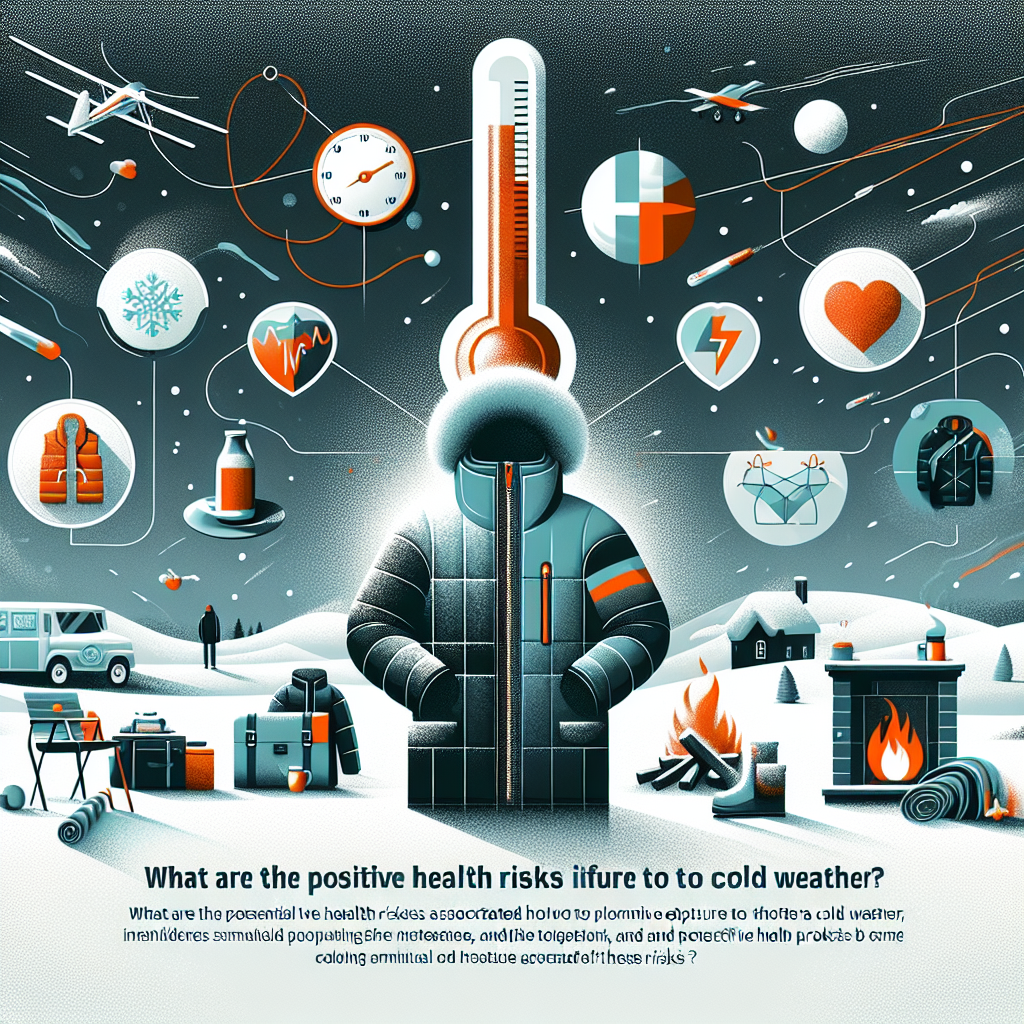In this article, we will be exploring the potential health risks that come with prolonged exposure to cold weather and learning how individuals can effectively protect themselves from these risks. As we all know, winter brings with it chilly temperatures and icy winds, which can have a significant impact on our well-being. By understanding the dangers that cold weather poses to our health and implementing the appropriate precautions, we can ensure a safe and enjoyable winter season.

Potential Health Risks of Prolonged Exposure to Cold Weather
Hypothermia
One of the most significant risks of prolonged exposure to cold weather is hypothermia. When your body loses heat faster than it can produce heat, your body temperature drops significantly. Symptoms of hypothermia include shivering, confusion, drowsiness, and even loss of consciousness. It is crucial to seek immediate medical help if you suspect someone is suffering from hypothermia.
Frostbite
Another health risk associated with cold weather is frostbite. Frostbite occurs when the skin and underlying tissues freeze due to exposure to extreme cold. It commonly affects the extremities such as fingers, toes, ears, and nose. Symptoms of frostbite include numbness, skin discoloration, and the affected area feeling hard or waxy. Frostbite can lead to tissue damage and even amputation, so it is essential to take proper precautions to prevent it.
Raynaud’s Disease
Raynaud’s Disease is a condition in which certain parts of your body, typically the fingers and toes, overreact to cold temperatures or stress. The blood vessels in these body parts narrow, resulting in reduced blood flow and causing the affected area to turn white or blue. This condition can be extremely uncomfortable and may cause pain and numbness. People with Raynaud’s Disease need to take extra care to protect themselves from the cold.
Increased Risk of Respiratory Infections
Prolonged exposure to cold weather can weaken the immune system, making you more susceptible to respiratory infections such as the common cold, flu, and bronchitis. Cold air can irritate the airways, making breathing difficult and increasing the likelihood of contracting respiratory illnesses. It is vital to take preventive measures, especially during the winter months when these infections are more prevalent.
Increased Risk of Cardiovascular Problems
Cold weather can put an additional strain on your cardiovascular system, increasing the risk of heart attacks and other heart-related problems. The cold constricts blood vessels, which can raise blood pressure and make the heart work harder. People with pre-existing heart conditions should be extra cautious when exposed to cold temperatures and take necessary precautions to minimize the risk.
Exacerbation of Chronic Conditions
For individuals with chronic conditions like asthma, arthritis, and Raynaud’s Disease, cold weather can worsen their symptoms. Cold temperatures can cause muscle stiffness, joint pain, and increased frequency and severity of asthma attacks. It is essential to manage these conditions effectively and take preventive measures to alleviate the impact cold weather might have on them.
Decreased Immune Function
Prolonged exposure to cold weather can weaken your immune system, making you more susceptible to infections. The exact reason behind this decrease in immune function is not fully understood, but it is believed that the cold can suppress immune responses and make it easier for viruses and bacteria to invade the body. Boosting your immune system through healthy habits becomes even more critical during colder months.
Vitamin D Deficiency
During cold weather, people tend to spend less time outdoors, leading to a decrease in sunlight exposure. Sunlight is necessary for the body to produce vitamin D, a nutrient crucial for bone health, immune function, and overall well-being. Reduced vitamin D levels can result in deficiencies and increase the risk of various health problems. It is essential to ensure you get enough vitamin D through diet and supplementation during the winter months.
Seasonal Affective Disorder (SAD)
Seasonal Affective Disorder, also known as SAD, is a type of depression that typically affects individuals during the winter months when daylight is limited. Cold weather and lack of sunlight can disrupt the body’s internal clock and affect serotonin levels, leading to symptoms such as fatigue, sadness, and loss of interest. If you experience these symptoms, it is essential to seek professional help and consider light therapy or other recommended treatments.
Dehydration
Many people think hydration is only important during hot weather, but staying adequately hydrated is crucial year-round, including in cold weather. The body loses water through respiration, and the cold air can increase fluid loss through moisture in your breath. Additionally, people tend to drink less water during colder months. Dehydration can lead to various health issues, including dry skin, fatigue, and weakened immune function.
Effective Ways to Protect Yourself from Health Risks in Cold Weather
Dress in Layers
Layering your clothing is crucial when facing cold weather. Wearing multiple layers of clothing traps warm air close to your body, providing insulation. Start with a moisture-wicking base layer to keep sweat away from your skin, add a middle layer for insulation, and finish with an outer layer that is windproof and waterproof. This layering system allows you to adjust your clothing to keep comfortable as temperatures fluctuate.
Cover Exposed Skin and Extremities
When venturing out in cold weather, it’s essential to cover exposed skin to minimize the risk of frostbite. Wear gloves or mittens to protect your hands, scarves or masks to cover your nose and mouth, and hats or earmuffs to protect your ears. Properly covering these vulnerable areas helps retain body heat and prevent frostbite.
Include Warm Headwear and Footwear
Loss of body heat through your head and feet can significantly impact your overall comfort and health in cold weather. To keep warm, wear a hat or beanie that covers your ears, as well as insulated and waterproof boots or shoes. It is also essential to wear wool or thermal socks to keep your feet dry and warm.
Stay Hydrated
Remember to drink plenty of fluids, even if you don’t feel thirsty. Your body still needs hydration, even in cold weather. Opt for warm beverages like herbal teas, hot water with lemon, and soups to stay hydrated and warm. Avoid excessive consumption of caffeine and alcohol, as they can contribute to dehydration.
Eat a Balanced Diet
Maintaining a balanced diet is essential for overall health, including during cold weather. A well-rounded diet rich in fruits, vegetables, whole grains, lean proteins, and healthy fats can boost your immune system and provide the necessary nutrients to keep your body functioning optimally. Incorporate warming foods like soups, stews, and hot drinks to help regulate body temperature.
Get Sufficient Vitamin D
Since sunlight exposure is limited during cold weather, it’s important to ensure you get enough vitamin D through alternative sources. Include foods rich in vitamin D in your diet, such as fatty fish, fortified dairy products, egg yolks, and mushrooms. If needed, talk to your healthcare provider about vitamin D supplementation to maintain optimal levels.
Exercise Regularly
Regular exercise is vital for overall health and well-being, even in cold weather. Engaging in physical activity helps improve circulation, boost energy levels, and strengthen the immune system. Find indoor exercise options like gym workouts, home exercises, or group fitness classes. If you prefer outdoor activities, choose appropriate clothing and exercise during warmer parts of the day.
Use Heating Appliances Safely
With colder temperatures, it’s common to rely on heating appliances to keep warm indoors. However, it’s essential to use them safely to prevent accidents and health risks. Ensure all appliances are in good working condition, keep flammable materials away from heaters, and never leave them unattended. Use space heaters with automatic shut-off features and consider regular maintenance for your heating system.
Maintain Good Indoor Air Quality
During colder months, people tend to spend more time indoors, making indoor air quality crucial. Proper ventilation, regular dusting and cleaning, and avoiding the use of harmful chemicals can help maintain good indoor air quality. Consider using air purifiers or opening windows occasionally to allow fresh air circulation.
Be Mindful of Medications
If you take medications regularly, it’s essential to be mindful of their potential interactions with cold weather. Some medications may increase sensitivity to cold or have side effects that could be exacerbated in cold temperatures. Consult with your healthcare provider to understand any potential risks or precautions related to your medication and cold weather exposure.
Taking steps to protect yourself from the potential health risks associated with prolonged exposure to cold weather is crucial. By dressing appropriately, prioritizing hydration, maintaining a balanced lifestyle, and practicing good self-care, you can enjoy the winter season while keeping your health and well-being intact. Remember to be mindful of your body’s signals and seek medical attention if you experience severe symptoms or concerns. Stay warm, stay healthy, and enjoy the beauty of winter!


